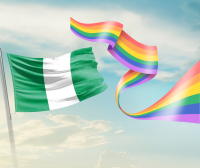Colonial Laws and the Shaping of Gender and Sexuality Norms in Nigeria

Introduction
The impact of colonialism on post-colonial societies is a topic of extensive academic study and debate. My PhD research topic Gender and Sexuality Bias in Nigeria: A Colonial and Religious Importation. The effects of Imported Religions-Christianity and Islam, and British colonial laws in Nigeria on current gender and sexuality norms, are particularly relevant. This research explores the depth of this influence, focusing on how colonial legislation and social and cultural imposition have shaped Nigeria's modern perspectives and practices regarding gender and sexuality.
The legacy of colonialism has left an indelible mark on various aspects of post-colonial Nigerian societies, with legal and cultural frameworks among the most affected. The British colonial administration imposed a legal system that significantly altered Indigenous social structures and norms, and these changes were not only legal but also cultural, embedding Western notions of gender roles and sexuality into Nigerian society.
The Colonial Construct of Gender and Sexuality
British colonial rule in Nigeria was rooted in a patriarchal perspective that established a hierarchy of gender roles. The introduction of Western legal systems, such as the Criminal Code and the Native Courts Ordinance, reinforced this patriarchal structure. These laws codified and legitimized existing gender inequalities while introducing new forms of gender subordination. For instance, the concept of coverture, which denied married women legal personality, making them extensions of their husband's ownership was imported from English common law. Women also had restricted land ownership and inheritance access, perpetuating economic inequality.
Moreover, colonial authorities actively sought to regulate sexuality with the Criminal Code criminalising same-sex sexual conduct, a law that remains in force today. Laws regulating female sexuality, such as those against adultery, were used to control women's behaviour and restrict their freedom. These pieces of legislation were not merely a reflection of Victorian morality but a tool for colonial control. By criminalizing non-heteronormative sexualities, the colonial state sought to regulate population growth, maintain social order, and justify its civilising mission.
Cultural Overhaul
Colonialism was more than just lawmaking; it was a deliberate shaping of society. Missionaries and colonial administrators worked in tandem to redefine gender and sexuality, imposing new norms and values. They introduced Western concepts of marriage, family, and domesticity, often at the expense of indigenous practices, and this process of cultural transformation had far-reaching consequences. For example, English common law influenced the Matrimonial Causes Act, which emphasized monogamy and established strict grounds for divorce. It often placed women in disadvantageous positions regarding marital dissolution and property rights, restricting their independence and financial security.
The Lingering Shadow of Colonial Law
The influence of colonial laws on gender and sexuality in Nigeria is clearly visible in today's society. For instance, current legal structures related to marriage, divorce, inheritance, and child custody still reflect colonial-era legislation. These frameworks often disadvantage women and uphold patriarchal norms, perpetuating inequalities rooted in the colonial past.
The colonial-era laws that criminalised same-sex sexual conduct continue to exert a profound influence on Nigerian society, leading to widespread discrimination and marginalisation of LGBTQ+ individuals. These laws, imported from the British legal system, not only criminalise consensual same-sex relationships but also foster an environment of fear and persecution. This legal framework has resulted in significant social stigma, limiting the rights and freedoms of LGBTQ+ people, and often subjecting them to violence and discrimination. The enduring presence of these colonial laws has hindered the progress toward equality and acceptance, deeply affecting the lives of LGBTQ+ individuals and perpetuating a cycle of marginalisation within communities across Nigeria.
While colonial rule imposed a singular model of gender and sexuality, it's essential to recognise the resilience of local cultures and the resistance to colonial norms. However, despite these counter-currents, the overarching impact of colonialism was to solidify patriarchal power structures and restrict the spectrum of gender and sexual expression.
Closing
To truly understand the complexities of gender and sexuality in contemporary Nigeria, it's essential to delve into the colonial era, and by tracing the roots of current issues back to their colonial origins, we can appreciate how deeply embedded these imported norms have become. A critical examination of this colonial legacy is crucial for developing effective strategies to promote gender and sexual equality in Nigeria.
Understanding the historical context is key to developing effective strategies to tackle these deeply ingrained issues. We must acknowledge both the colonial legacies and the current realities in Nigeria to create a roadmap towards a more equitable future. This approach respects Nigeria's rich cultural heritage while advocating for universal human rights.
Gabriel Omachi

Gabriel is a Law Ph.D. researcher at the Faculty of Business and Law (FBL) at the Open University, focusing on the topic of "Gender and Sexuality Discrimination in Nigeria: A Colonial and Religious Importation." Gabriel holds a Bachelor of Laws and a Masters in Law from the University of Jos, Nigeria. He completed his legal training at the Nigeria Law School, where he was called to the bar as a Barrister and Solicitor.
With extensive experience in criminal and civil law practice across various Nigerian states, Gabriel has appeared in all Superior Courts, including the High Courts, the Court of Appeal, and the Supreme Court. His strong interest in human rights is deeply intertwined with his passion for understanding how colonial laws have shaped Nigeria's legal landscape, particularly regarding gender and sexuality issues. Prof. Caroline Derry and Dr. Sophie Doherty supervise his doctoral research.
Gabriel is a committed advocate for social justice, dedicating his legal career and volunteer efforts to supporting marginalized communities. He enjoys engaging in interdisciplinary research that explores legal complexities from multiple perspectives, finding it both enriching and essential for a comprehensive understanding of the issues he studies.